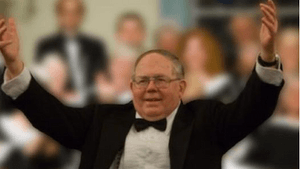Stay in the Loop
BSR publishes on a weekly schedule, with an email newsletter every Wednesday and Thursday morning. There’s no paywall, and subscribing is always free.
Three things I learned from Gregg Smith
Kile Smith recalls the Adirondack Festival of American Music

We weren’t related, not any more than any other two random Smiths are, and I met him only once, but Gregg Smith, in three ways, made me a composer. Smith died in July at the age of 84.
1. Work
The choral conductor, composer, and founder of the Gregg Smith Singers died this past July at the age of 84. He began his choir in 1955, and through his recordings and concert series became one of the most renowned American choral conductors. He brought a flexible, clean, professional sound to recordings of Stravinsky and Schoenberg. He was in the vanguard rediscovering the American pioneers William Billings and Charles Ives. Dozens and dozens of American composers found a voice because of him. In 1973 he founded the Adirondack Festival of American Music in Saranac Lake, New York, an amalgamation of concerts and composer workshops, and one day, in the early 1990s, I decided to apply.
Composers younger than I were making splashes. Composers my age had university jobs. I liked my nine-to-five time at the Fleisher Collection of Orchestral Music in the Free Library of Philadelphia, and I was constantly composing, but in my mid-30s I felt as though my wheels were spinning.
Some knew my music. Performances, some good ones, arrived, but spottily. I was hoping I might still be what the grant and competition applications called “emerging,” but time was running out on that, if it hadn’t already. Desultory attempts at informing conductors or performers about my music were met mostly with silence. Somehow, I needed to break out. I was composing, I had never stopped composing, but it was time for me to be a composer.
And then, Gregg Smith accepted my application, which was, basically, a new choral work. So, I drove my wife and our young daughter to a rented cabin near Saranac Lake.
I had been in the Poconos a few times, and often to the Catskills, where my wife was raised. But the Adirondacks, when you leave the highway and enter them, are — they are beautiful, of course — but they are strange. The Adirondacks are strange and foreboding. Trees are dark in the Adirondacks and gorges are deep, and when you drive in those mountains for the first time you mind well what you are doing.
We drove into this country, through dark forests and past dark mountain lakes. And then I walked into a room of composers, singers, and Gregg Smith.
And he already knew my piece.
2. Be nice
I did not know Gregg Smith, but I knew he had a list of recordings as long as my arm. I knew he ran concerts in New York City. He certainly did not know me. I was not expecting Gregg Smith to be an unassuming, smiling man, clerical even, but with a twinkle. He could be Father Brown. He shook my hand warmly, thanked me for composing my piece, and told me that it was good — it was very good.
He explained to everyone — the singers, the other composers — what I was doing in my piece. He asked me questions about why I chose a certain note or decided to change a syllable here rather than there. He treated every one of us that way. He stopped often and suggested other, more efficient ways to get the effects we were trying for. He asked question after question, probing us for our intent. He compared passages to Stravinsky, Beeson, Carter, to composers he championed over his career. He sought the singers’s advice. He didn’t mind fessing up to his own mistakes.
He laughed easily. That was a good sign. People who laugh easily treat other people with respect.
3. Work harder
He made us all sing each other’s pieces; we rehearsed alongside his Singers. Sometimes the music was hard, and I appreciated more what a professional choir can do.
My piece went well. It sounded good, it hung together. It was four verses of a Lutheran Easter chorale, and I had set it with delving, twisting, chromatic counterpoint, all four verses over the same music. It was dense and complicated. It had taken me weeks and weeks to write, and I felt emboldened when he didn’t want to change one note of it.
“You love Bach, don’t you?” he asked.
“Oh, yes,” I said.
“Mm-hm," he smiled. “But you know what I’m thinking? This isn’t the piece. This is the last verse of the piece.”
He went on to say that this music, four times through, was simply too much. By the fourth time, it was blunted. He said that it was some of the loveliest writing he had seen, and he loved it, but I had only completed one verse.
I took a deep breath and thought of all the work I already put into it. I nodded, and laughed, because he was right. I hadn’t seen it until then, but it was clear as a sky reflected in a mountain lake. Gregg Smith was telling me, in front of all these composers and singers, that my piece was quite good but could be quite better, and I don’t know how to put it any way other than to say I was happy about it.
Gregg Smith treated me like a colleague, like I was supposed to be there. He treated me like a fellow composer. And then the funniest thing happened: I felt like I was his colleague. I felt like I was supposed to be there. I felt like a composer.
My wheels stopped spinning. It would take years for my performances to increase, for the wheels to get traction, but driving back from the Adirondacks with my wife and daughter, I was a composer.
Sign up for our newsletter
All of the week's new articles, all in one place. Sign up for the free weekly BSR newsletters, and don't miss a conversation.

 Kile Smith
Kile Smith